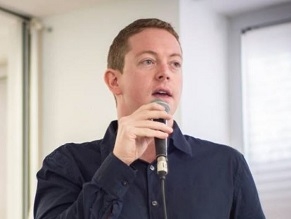|
World Jewish News

Hanan Rubin, Hitorerut Member of Jerusalem Municipal Council. (photo credit:OFFICE OF HANAN RUBIN)
|
After funding flip, pluralistic Jewish groups on the rise in Jerusalem
22.07.2015, Israel Leaders of Jewish pluralism and renewal groups have hailed the funds allocated to them by the Jerusalem Municipality as evidence that such organizations are thriving and flourishing in the nation’s capital.
Announced on Tuesday but approved two weeks ago, the Jerusalem Municipality authorized the funding of a variety of pluralistic Jewish renewal organizations active in the city from educational budgets distributed from municipal coffers.
The financial support for these groups was designated for organizations that “disseminate knowledge in an educational and values passed framework” is being touted as a significant step towards gaining greater acceptance and recognition of the role which the Jewish renewal movement is taking in both Jerusalem and broader Israeli society.
Six groups in total were allocated money by the Jerusalem Municipality’s Support Committee, one of which was “Reshut Harabim,” an umbrella organization founded in 2011 and comprising 36 Jewish renewal groups in Jerusalem.
These organizations cross a broad spectrum of Jewish denominations and identities, ranging from secular groups promoting Jewish culture and values to Reform and Conservative congregations and institutions as well as modern Orthodox organizations.
Included among them are the Hartman Institute, the Kolot pluralist study center, The Ruach Nachon pre-military academy, the Beit Hillel association of national-religious rabbis, and the Hebrew Union College in Jerusalem of the Reform movement, among others.
Funding from the Jerusalem Municipality was available to organizations that provide weekly lessons in Torah study for adults totaling at least 400 hours annually. The other five umbrella groups allocated funding were from the haredi sector.
All six consortia will split NIS 500,000 which will be distributed according to the amount of hours each single institution teaches.
Hanan Rubin, a member of the Jerusalem Municipal Council for the Hitorerut party and chairman of the Support Committee that approved the funds, said that the approval demonstrated that the different societal components of Jerusalem could work together for their mutual benefit.
Rubin, who was the primary proponent of funding for pluralist Jewish groups in the city, pointed out that Support Committee includes representatives from numerous parties in the Municipal Council including haredi and national-religious members.
He also noted that he had worked closely and carefully with the haredi representatives who he said acknowledged that funding for educational institutions could not only be directed to the haredi sector because of the societal diversity in the capital.
“I am excited by the fact that the support for Jewish renewal organizations passed with total agreement and with the support of the mayor, with the understanding that Jerusalem is a diverse and inclusive city and that it must remain so,” said Rubin.
Rabbi Rachel Sabath Beit-Halachmi, a senior official in at Hebrew Union College, described the funding as a very positive step in strengthening Jewish renewal in Jerusalem, which she described as a movement encouraging individuals to decide how they wish to identify with Judaism.
“Jewish renewal is the idea that every Jew should have the autonomous capacity to decide how they celebrate Judaism and identify as a Jew,” said the rabbi. “It has become a term for the many organizations, which are largely non-Orthodox, that lead Jews of all backgrounds and levels of observance in study and celebration.”
She said that the Jewish renewal movement was “enjoying huge success, and has “engaged the majority of Israeli society in Judaism and a fuller expression of who they are as Israelis and Jews, and is transforming the face of Israeli society,” adding that the allocation of funds was proof of this new phenomenon.
Laura Gilinsky, the chairwoman of Reshut Harabim, said the funding reflected a decision to support a “multi-faceted Jerusalem” and said she hoped such cooperation will increase in the future.
“Jewish renewal has grown massively in Jerusalem in recent years and the amount of participants in classes and the variety of activities of groups that are members of Reshut Harabim testifies to the desire of the city’s residents to have an intimate relationship with Judaism in a way that suits their way of life,” said Gilinsky.
By JEREMY SHARON
JPost.com
|
|
